Early Childhood Education: Cultural Awareness and Ethics Report
VerifiedAdded on 2023/01/20
|13
|3317
|68
Report
AI Summary
This report delves into the critical aspects of cultural competency and cultural awareness in early childhood education. It emphasizes the crucial role of teachers in fostering culturally competent behavior in young children, highlighting the importance of multicultural awareness and knowledge of diverse cultural backgrounds. The report covers the requirements for culturally sensitive teachers, professional codes of ethics, cultural awareness practices when working with Aboriginal and Torres Strait Islander families, and professional considerations for establishing healthy relationships with these families. It discusses the need for teachers to possess effective communication skills, value cultural diversity, and understand the historical and local cultural aspects of their students' backgrounds. The report also emphasizes the importance of maintaining professional conduct and ethical considerations, including respecting children's rights, creating safe learning environments, and advocating for children's rights regardless of their background. Furthermore, it outlines specific protocols and practices for engaging with Aboriginal and Torres Strait Islander families, emphasizing respect, sensitivity, and consultation. The report concludes by highlighting the professional and ethical considerations for building strong partnerships with these families, including the importance of respecting elders and understanding their cultural practices.
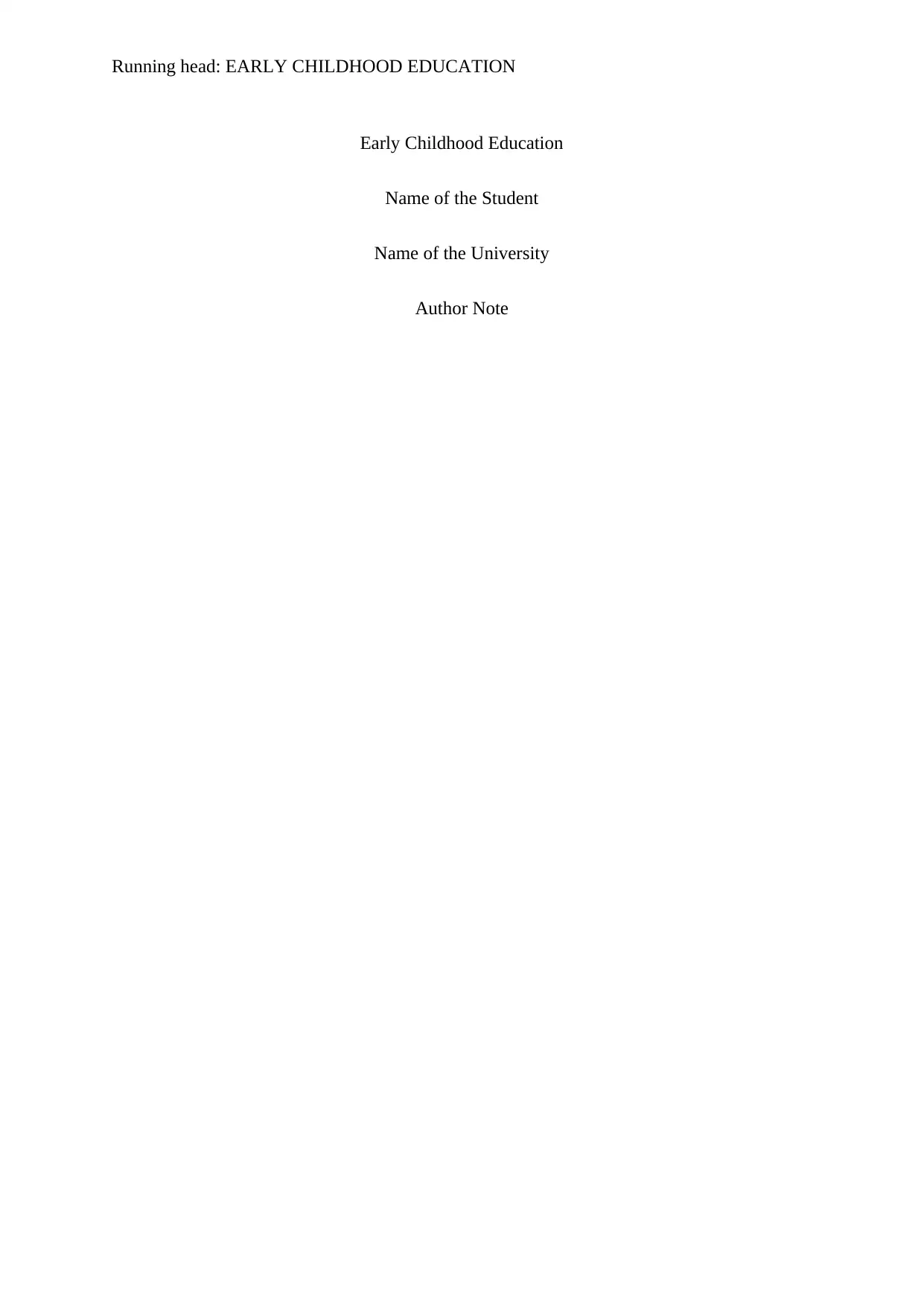
Running head: EARLY CHILDHOOD EDUCATION
Early Childhood Education
Name of the Student
Name of the University
Author Note
Early Childhood Education
Name of the Student
Name of the University
Author Note
Paraphrase This Document
Need a fresh take? Get an instant paraphrase of this document with our AI Paraphraser
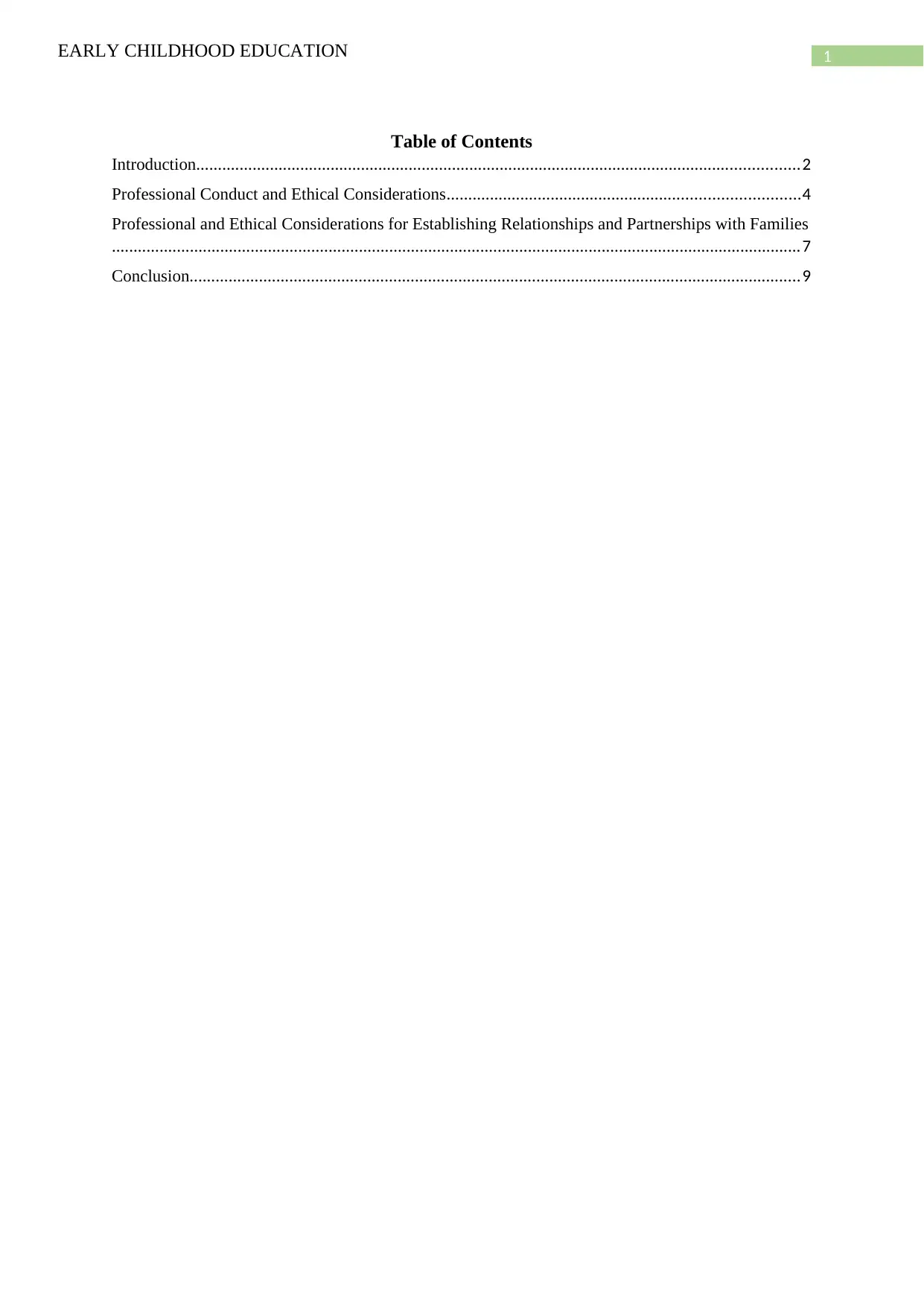
1EARLY CHILDHOOD EDUCATION
Table of Contents
Introduction...........................................................................................................................................2
Professional Conduct and Ethical Considerations.................................................................................4
Professional and Ethical Considerations for Establishing Relationships and Partnerships with Families
...............................................................................................................................................................7
Conclusion.............................................................................................................................................9
Table of Contents
Introduction...........................................................................................................................................2
Professional Conduct and Ethical Considerations.................................................................................4
Professional and Ethical Considerations for Establishing Relationships and Partnerships with Families
...............................................................................................................................................................7
Conclusion.............................................................................................................................................9
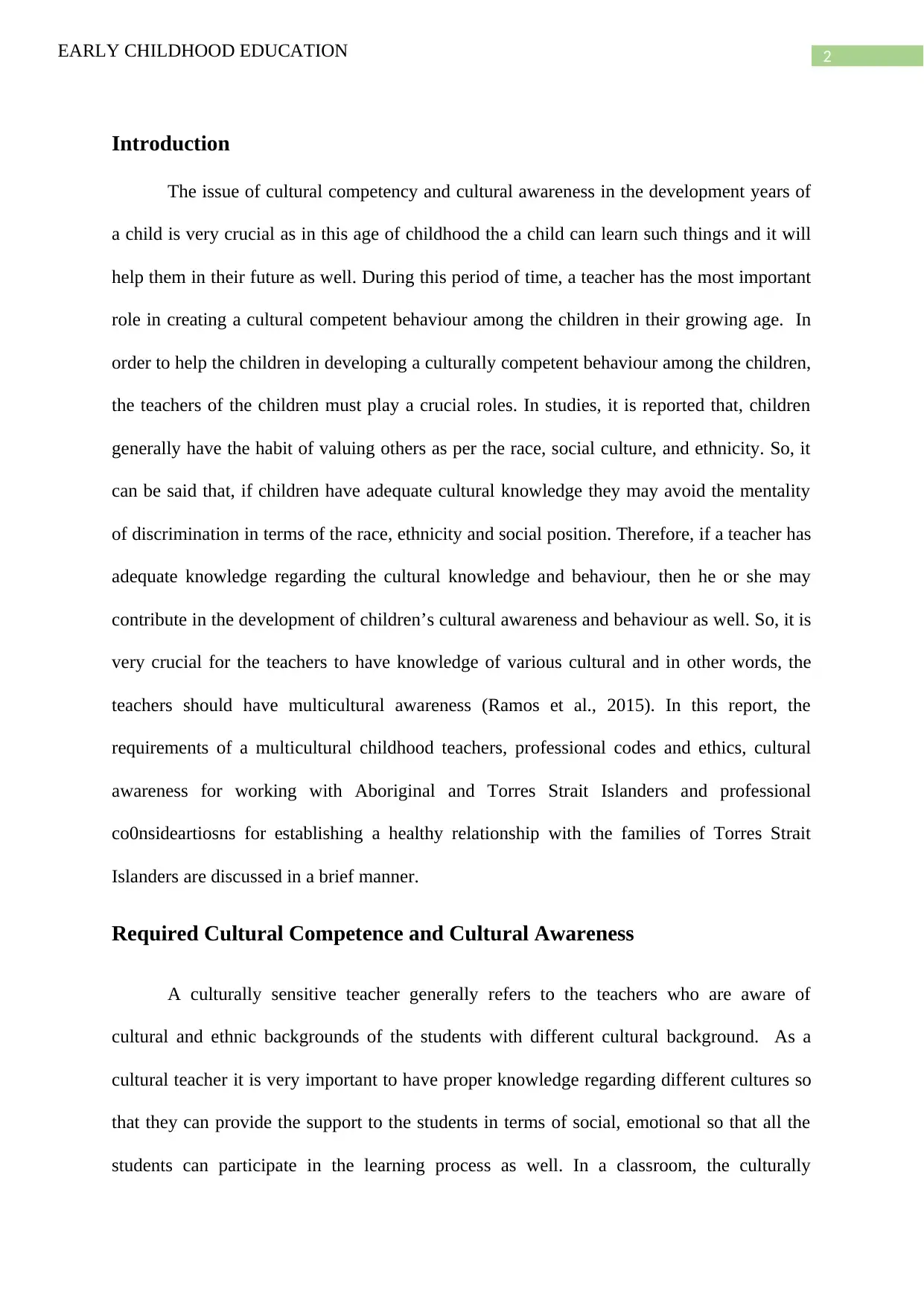
2EARLY CHILDHOOD EDUCATION
Introduction
The issue of cultural competency and cultural awareness in the development years of
a child is very crucial as in this age of childhood the a child can learn such things and it will
help them in their future as well. During this period of time, a teacher has the most important
role in creating a cultural competent behaviour among the children in their growing age. In
order to help the children in developing a culturally competent behaviour among the children,
the teachers of the children must play a crucial roles. In studies, it is reported that, children
generally have the habit of valuing others as per the race, social culture, and ethnicity. So, it
can be said that, if children have adequate cultural knowledge they may avoid the mentality
of discrimination in terms of the race, ethnicity and social position. Therefore, if a teacher has
adequate knowledge regarding the cultural knowledge and behaviour, then he or she may
contribute in the development of children’s cultural awareness and behaviour as well. So, it is
very crucial for the teachers to have knowledge of various cultural and in other words, the
teachers should have multicultural awareness (Ramos et al., 2015). In this report, the
requirements of a multicultural childhood teachers, professional codes and ethics, cultural
awareness for working with Aboriginal and Torres Strait Islanders and professional
co0nsideartiosns for establishing a healthy relationship with the families of Torres Strait
Islanders are discussed in a brief manner.
Required Cultural Competence and Cultural Awareness
A culturally sensitive teacher generally refers to the teachers who are aware of
cultural and ethnic backgrounds of the students with different cultural background. As a
cultural teacher it is very important to have proper knowledge regarding different cultures so
that they can provide the support to the students in terms of social, emotional so that all the
students can participate in the learning process as well. In a classroom, the culturally
Introduction
The issue of cultural competency and cultural awareness in the development years of
a child is very crucial as in this age of childhood the a child can learn such things and it will
help them in their future as well. During this period of time, a teacher has the most important
role in creating a cultural competent behaviour among the children in their growing age. In
order to help the children in developing a culturally competent behaviour among the children,
the teachers of the children must play a crucial roles. In studies, it is reported that, children
generally have the habit of valuing others as per the race, social culture, and ethnicity. So, it
can be said that, if children have adequate cultural knowledge they may avoid the mentality
of discrimination in terms of the race, ethnicity and social position. Therefore, if a teacher has
adequate knowledge regarding the cultural knowledge and behaviour, then he or she may
contribute in the development of children’s cultural awareness and behaviour as well. So, it is
very crucial for the teachers to have knowledge of various cultural and in other words, the
teachers should have multicultural awareness (Ramos et al., 2015). In this report, the
requirements of a multicultural childhood teachers, professional codes and ethics, cultural
awareness for working with Aboriginal and Torres Strait Islanders and professional
co0nsideartiosns for establishing a healthy relationship with the families of Torres Strait
Islanders are discussed in a brief manner.
Required Cultural Competence and Cultural Awareness
A culturally sensitive teacher generally refers to the teachers who are aware of
cultural and ethnic backgrounds of the students with different cultural background. As a
cultural teacher it is very important to have proper knowledge regarding different cultures so
that they can provide the support to the students in terms of social, emotional so that all the
students can participate in the learning process as well. In a classroom, the culturally
⊘ This is a preview!⊘
Do you want full access?
Subscribe today to unlock all pages.

Trusted by 1+ million students worldwide
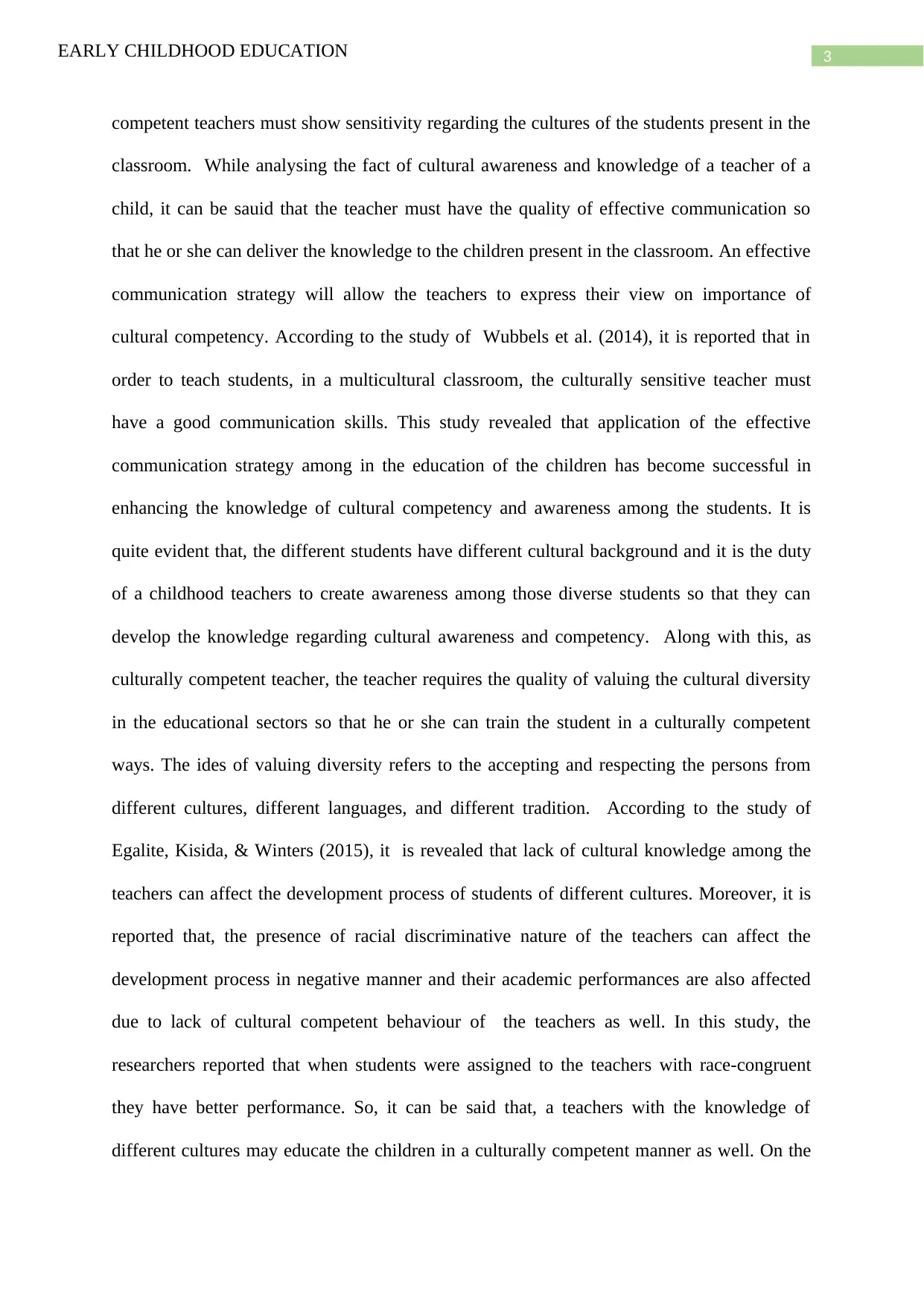
3EARLY CHILDHOOD EDUCATION
competent teachers must show sensitivity regarding the cultures of the students present in the
classroom. While analysing the fact of cultural awareness and knowledge of a teacher of a
child, it can be sauid that the teacher must have the quality of effective communication so
that he or she can deliver the knowledge to the children present in the classroom. An effective
communication strategy will allow the teachers to express their view on importance of
cultural competency. According to the study of Wubbels et al. (2014), it is reported that in
order to teach students, in a multicultural classroom, the culturally sensitive teacher must
have a good communication skills. This study revealed that application of the effective
communication strategy among in the education of the children has become successful in
enhancing the knowledge of cultural competency and awareness among the students. It is
quite evident that, the different students have different cultural background and it is the duty
of a childhood teachers to create awareness among those diverse students so that they can
develop the knowledge regarding cultural awareness and competency. Along with this, as
culturally competent teacher, the teacher requires the quality of valuing the cultural diversity
in the educational sectors so that he or she can train the student in a culturally competent
ways. The ides of valuing diversity refers to the accepting and respecting the persons from
different cultures, different languages, and different tradition. According to the study of
Egalite, Kisida, & Winters (2015), it is revealed that lack of cultural knowledge among the
teachers can affect the development process of students of different cultures. Moreover, it is
reported that, the presence of racial discriminative nature of the teachers can affect the
development process in negative manner and their academic performances are also affected
due to lack of cultural competent behaviour of the teachers as well. In this study, the
researchers reported that when students were assigned to the teachers with race-congruent
they have better performance. So, it can be said that, a teachers with the knowledge of
different cultures may educate the children in a culturally competent manner as well. On the
competent teachers must show sensitivity regarding the cultures of the students present in the
classroom. While analysing the fact of cultural awareness and knowledge of a teacher of a
child, it can be sauid that the teacher must have the quality of effective communication so
that he or she can deliver the knowledge to the children present in the classroom. An effective
communication strategy will allow the teachers to express their view on importance of
cultural competency. According to the study of Wubbels et al. (2014), it is reported that in
order to teach students, in a multicultural classroom, the culturally sensitive teacher must
have a good communication skills. This study revealed that application of the effective
communication strategy among in the education of the children has become successful in
enhancing the knowledge of cultural competency and awareness among the students. It is
quite evident that, the different students have different cultural background and it is the duty
of a childhood teachers to create awareness among those diverse students so that they can
develop the knowledge regarding cultural awareness and competency. Along with this, as
culturally competent teacher, the teacher requires the quality of valuing the cultural diversity
in the educational sectors so that he or she can train the student in a culturally competent
ways. The ides of valuing diversity refers to the accepting and respecting the persons from
different cultures, different languages, and different tradition. According to the study of
Egalite, Kisida, & Winters (2015), it is revealed that lack of cultural knowledge among the
teachers can affect the development process of students of different cultures. Moreover, it is
reported that, the presence of racial discriminative nature of the teachers can affect the
development process in negative manner and their academic performances are also affected
due to lack of cultural competent behaviour of the teachers as well. In this study, the
researchers reported that when students were assigned to the teachers with race-congruent
they have better performance. So, it can be said that, a teachers with the knowledge of
different cultures may educate the children in a culturally competent manner as well. On the
Paraphrase This Document
Need a fresh take? Get an instant paraphrase of this document with our AI Paraphraser
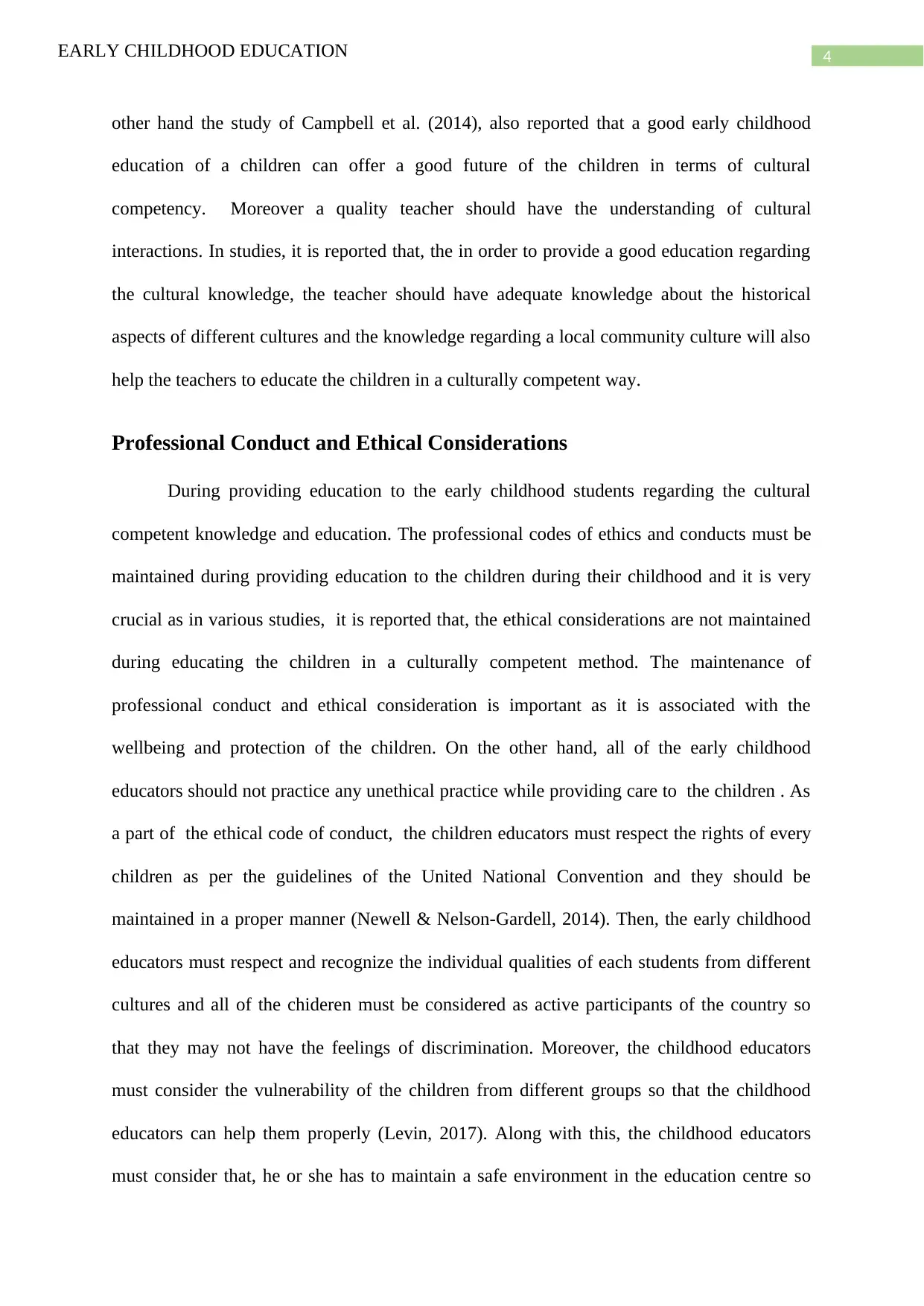
4EARLY CHILDHOOD EDUCATION
other hand the study of Campbell et al. (2014), also reported that a good early childhood
education of a children can offer a good future of the children in terms of cultural
competency. Moreover a quality teacher should have the understanding of cultural
interactions. In studies, it is reported that, the in order to provide a good education regarding
the cultural knowledge, the teacher should have adequate knowledge about the historical
aspects of different cultures and the knowledge regarding a local community culture will also
help the teachers to educate the children in a culturally competent way.
Professional Conduct and Ethical Considerations
During providing education to the early childhood students regarding the cultural
competent knowledge and education. The professional codes of ethics and conducts must be
maintained during providing education to the children during their childhood and it is very
crucial as in various studies, it is reported that, the ethical considerations are not maintained
during educating the children in a culturally competent method. The maintenance of
professional conduct and ethical consideration is important as it is associated with the
wellbeing and protection of the children. On the other hand, all of the early childhood
educators should not practice any unethical practice while providing care to the children . As
a part of the ethical code of conduct, the children educators must respect the rights of every
children as per the guidelines of the United National Convention and they should be
maintained in a proper manner (Newell & Nelson-Gardell, 2014). Then, the early childhood
educators must respect and recognize the individual qualities of each students from different
cultures and all of the chideren must be considered as active participants of the country so
that they may not have the feelings of discrimination. Moreover, the childhood educators
must consider the vulnerability of the children from different groups so that the childhood
educators can help them properly (Levin, 2017). Along with this, the childhood educators
must consider that, he or she has to maintain a safe environment in the education centre so
other hand the study of Campbell et al. (2014), also reported that a good early childhood
education of a children can offer a good future of the children in terms of cultural
competency. Moreover a quality teacher should have the understanding of cultural
interactions. In studies, it is reported that, the in order to provide a good education regarding
the cultural knowledge, the teacher should have adequate knowledge about the historical
aspects of different cultures and the knowledge regarding a local community culture will also
help the teachers to educate the children in a culturally competent way.
Professional Conduct and Ethical Considerations
During providing education to the early childhood students regarding the cultural
competent knowledge and education. The professional codes of ethics and conducts must be
maintained during providing education to the children during their childhood and it is very
crucial as in various studies, it is reported that, the ethical considerations are not maintained
during educating the children in a culturally competent method. The maintenance of
professional conduct and ethical consideration is important as it is associated with the
wellbeing and protection of the children. On the other hand, all of the early childhood
educators should not practice any unethical practice while providing care to the children . As
a part of the ethical code of conduct, the children educators must respect the rights of every
children as per the guidelines of the United National Convention and they should be
maintained in a proper manner (Newell & Nelson-Gardell, 2014). Then, the early childhood
educators must respect and recognize the individual qualities of each students from different
cultures and all of the chideren must be considered as active participants of the country so
that they may not have the feelings of discrimination. Moreover, the childhood educators
must consider the vulnerability of the children from different groups so that the childhood
educators can help them properly (Levin, 2017). Along with this, the childhood educators
must consider that, he or she has to maintain a safe environment in the education centre so

5EARLY CHILDHOOD EDUCATION
that all the children from different cultures may feel safe during the period of education. The
childhood educators must maintain the ethics of creating a safe care environment in the
education centre. Along with this, they have to ensure that the cultures, language, ethnicity
and families of each of the children should be advocated by the childhood educators in the
childhood education centre. Along with this, the early childhood educators must advocate the
children so that they are not discriminated in terms of their gender, age, ability, lifestyle,
ethnicity , family structure , economic status , language, religion, culture or national origin.
Along with this, it is the duty of the child care educators to gain knowledge regarding the
communities with which they are working (Hanover Research, 2014). All the laws and
policies regarding the child care , should be followed by the child educators as a part of their
ethical roles in delivering education to the children of different cultures. According to the
study of Barnhard (2014), it is reported that, a child educator must promote the culturally
appropriate knowledge and understandings of the children so that their individual needs can
be gained by the practice of ethical behaviour of the children educators. Moreover as a part
of the ethical considerations, all the children educators must respect the dignity and unique
nature of each of the children so that can feel the safe environment of the children education
centre or the schools. Apart from this considerations of the child educators, all the children
educators must follow that the they should not harm any children as a part of the practice of
humanity and they should not engage in such activities that can be disrespectful, dangerous,
intimidating, exploitative, degrading, , emotionally damaging or physically harmful to
children. The maintenance of code of ethics in the child education centre is very crucial as
maintenance of code of ethics by the child educators can make the children feel that they are
not at all discriminated in the child education centre (Hanover Research, 2014).
Cultural Awareness Practices and Protocols for Working with Aboriginal
and Torres Strait Islander Families
that all the children from different cultures may feel safe during the period of education. The
childhood educators must maintain the ethics of creating a safe care environment in the
education centre. Along with this, they have to ensure that the cultures, language, ethnicity
and families of each of the children should be advocated by the childhood educators in the
childhood education centre. Along with this, the early childhood educators must advocate the
children so that they are not discriminated in terms of their gender, age, ability, lifestyle,
ethnicity , family structure , economic status , language, religion, culture or national origin.
Along with this, it is the duty of the child care educators to gain knowledge regarding the
communities with which they are working (Hanover Research, 2014). All the laws and
policies regarding the child care , should be followed by the child educators as a part of their
ethical roles in delivering education to the children of different cultures. According to the
study of Barnhard (2014), it is reported that, a child educator must promote the culturally
appropriate knowledge and understandings of the children so that their individual needs can
be gained by the practice of ethical behaviour of the children educators. Moreover as a part
of the ethical considerations, all the children educators must respect the dignity and unique
nature of each of the children so that can feel the safe environment of the children education
centre or the schools. Apart from this considerations of the child educators, all the children
educators must follow that the they should not harm any children as a part of the practice of
humanity and they should not engage in such activities that can be disrespectful, dangerous,
intimidating, exploitative, degrading, , emotionally damaging or physically harmful to
children. The maintenance of code of ethics in the child education centre is very crucial as
maintenance of code of ethics by the child educators can make the children feel that they are
not at all discriminated in the child education centre (Hanover Research, 2014).
Cultural Awareness Practices and Protocols for Working with Aboriginal
and Torres Strait Islander Families
⊘ This is a preview!⊘
Do you want full access?
Subscribe today to unlock all pages.

Trusted by 1+ million students worldwide
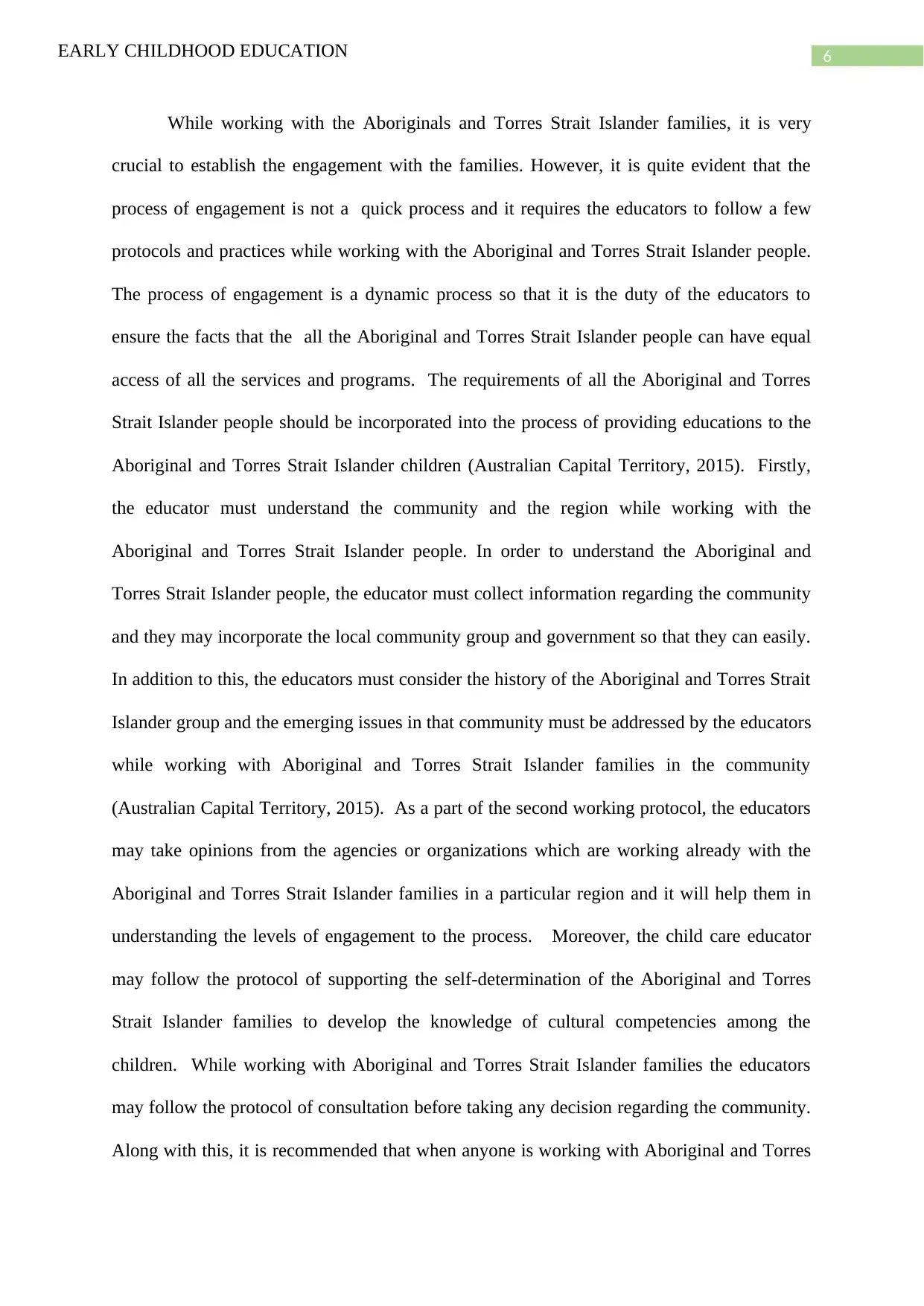
6EARLY CHILDHOOD EDUCATION
While working with the Aboriginals and Torres Strait Islander families, it is very
crucial to establish the engagement with the families. However, it is quite evident that the
process of engagement is not a quick process and it requires the educators to follow a few
protocols and practices while working with the Aboriginal and Torres Strait Islander people.
The process of engagement is a dynamic process so that it is the duty of the educators to
ensure the facts that the all the Aboriginal and Torres Strait Islander people can have equal
access of all the services and programs. The requirements of all the Aboriginal and Torres
Strait Islander people should be incorporated into the process of providing educations to the
Aboriginal and Torres Strait Islander children (Australian Capital Territory, 2015). Firstly,
the educator must understand the community and the region while working with the
Aboriginal and Torres Strait Islander people. In order to understand the Aboriginal and
Torres Strait Islander people, the educator must collect information regarding the community
and they may incorporate the local community group and government so that they can easily.
In addition to this, the educators must consider the history of the Aboriginal and Torres Strait
Islander group and the emerging issues in that community must be addressed by the educators
while working with Aboriginal and Torres Strait Islander families in the community
(Australian Capital Territory, 2015). As a part of the second working protocol, the educators
may take opinions from the agencies or organizations which are working already with the
Aboriginal and Torres Strait Islander families in a particular region and it will help them in
understanding the levels of engagement to the process. Moreover, the child care educator
may follow the protocol of supporting the self-determination of the Aboriginal and Torres
Strait Islander families to develop the knowledge of cultural competencies among the
children. While working with Aboriginal and Torres Strait Islander families the educators
may follow the protocol of consultation before taking any decision regarding the community.
Along with this, it is recommended that when anyone is working with Aboriginal and Torres
While working with the Aboriginals and Torres Strait Islander families, it is very
crucial to establish the engagement with the families. However, it is quite evident that the
process of engagement is not a quick process and it requires the educators to follow a few
protocols and practices while working with the Aboriginal and Torres Strait Islander people.
The process of engagement is a dynamic process so that it is the duty of the educators to
ensure the facts that the all the Aboriginal and Torres Strait Islander people can have equal
access of all the services and programs. The requirements of all the Aboriginal and Torres
Strait Islander people should be incorporated into the process of providing educations to the
Aboriginal and Torres Strait Islander children (Australian Capital Territory, 2015). Firstly,
the educator must understand the community and the region while working with the
Aboriginal and Torres Strait Islander people. In order to understand the Aboriginal and
Torres Strait Islander people, the educator must collect information regarding the community
and they may incorporate the local community group and government so that they can easily.
In addition to this, the educators must consider the history of the Aboriginal and Torres Strait
Islander group and the emerging issues in that community must be addressed by the educators
while working with Aboriginal and Torres Strait Islander families in the community
(Australian Capital Territory, 2015). As a part of the second working protocol, the educators
may take opinions from the agencies or organizations which are working already with the
Aboriginal and Torres Strait Islander families in a particular region and it will help them in
understanding the levels of engagement to the process. Moreover, the child care educator
may follow the protocol of supporting the self-determination of the Aboriginal and Torres
Strait Islander families to develop the knowledge of cultural competencies among the
children. While working with Aboriginal and Torres Strait Islander families the educators
may follow the protocol of consultation before taking any decision regarding the community.
Along with this, it is recommended that when anyone is working with Aboriginal and Torres
Paraphrase This Document
Need a fresh take? Get an instant paraphrase of this document with our AI Paraphraser
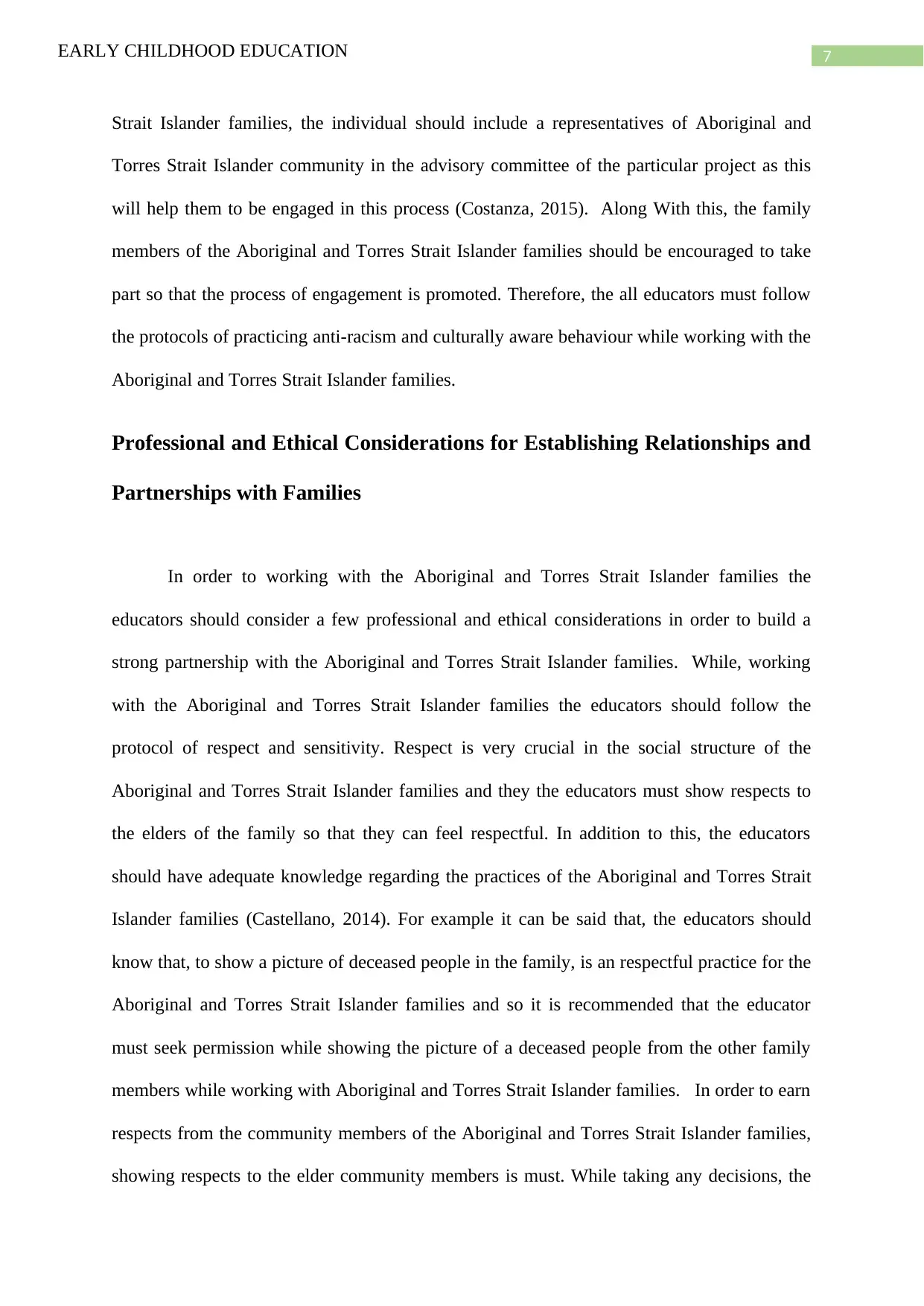
7EARLY CHILDHOOD EDUCATION
Strait Islander families, the individual should include a representatives of Aboriginal and
Torres Strait Islander community in the advisory committee of the particular project as this
will help them to be engaged in this process (Costanza, 2015). Along With this, the family
members of the Aboriginal and Torres Strait Islander families should be encouraged to take
part so that the process of engagement is promoted. Therefore, the all educators must follow
the protocols of practicing anti-racism and culturally aware behaviour while working with the
Aboriginal and Torres Strait Islander families.
Professional and Ethical Considerations for Establishing Relationships and
Partnerships with Families
In order to working with the Aboriginal and Torres Strait Islander families the
educators should consider a few professional and ethical considerations in order to build a
strong partnership with the Aboriginal and Torres Strait Islander families. While, working
with the Aboriginal and Torres Strait Islander families the educators should follow the
protocol of respect and sensitivity. Respect is very crucial in the social structure of the
Aboriginal and Torres Strait Islander families and they the educators must show respects to
the elders of the family so that they can feel respectful. In addition to this, the educators
should have adequate knowledge regarding the practices of the Aboriginal and Torres Strait
Islander families (Castellano, 2014). For example it can be said that, the educators should
know that, to show a picture of deceased people in the family, is an respectful practice for the
Aboriginal and Torres Strait Islander families and so it is recommended that the educator
must seek permission while showing the picture of a deceased people from the other family
members while working with Aboriginal and Torres Strait Islander families. In order to earn
respects from the community members of the Aboriginal and Torres Strait Islander families,
showing respects to the elder community members is must. While taking any decisions, the
Strait Islander families, the individual should include a representatives of Aboriginal and
Torres Strait Islander community in the advisory committee of the particular project as this
will help them to be engaged in this process (Costanza, 2015). Along With this, the family
members of the Aboriginal and Torres Strait Islander families should be encouraged to take
part so that the process of engagement is promoted. Therefore, the all educators must follow
the protocols of practicing anti-racism and culturally aware behaviour while working with the
Aboriginal and Torres Strait Islander families.
Professional and Ethical Considerations for Establishing Relationships and
Partnerships with Families
In order to working with the Aboriginal and Torres Strait Islander families the
educators should consider a few professional and ethical considerations in order to build a
strong partnership with the Aboriginal and Torres Strait Islander families. While, working
with the Aboriginal and Torres Strait Islander families the educators should follow the
protocol of respect and sensitivity. Respect is very crucial in the social structure of the
Aboriginal and Torres Strait Islander families and they the educators must show respects to
the elders of the family so that they can feel respectful. In addition to this, the educators
should have adequate knowledge regarding the practices of the Aboriginal and Torres Strait
Islander families (Castellano, 2014). For example it can be said that, the educators should
know that, to show a picture of deceased people in the family, is an respectful practice for the
Aboriginal and Torres Strait Islander families and so it is recommended that the educator
must seek permission while showing the picture of a deceased people from the other family
members while working with Aboriginal and Torres Strait Islander families. In order to earn
respects from the community members of the Aboriginal and Torres Strait Islander families,
showing respects to the elder community members is must. While taking any decisions, the
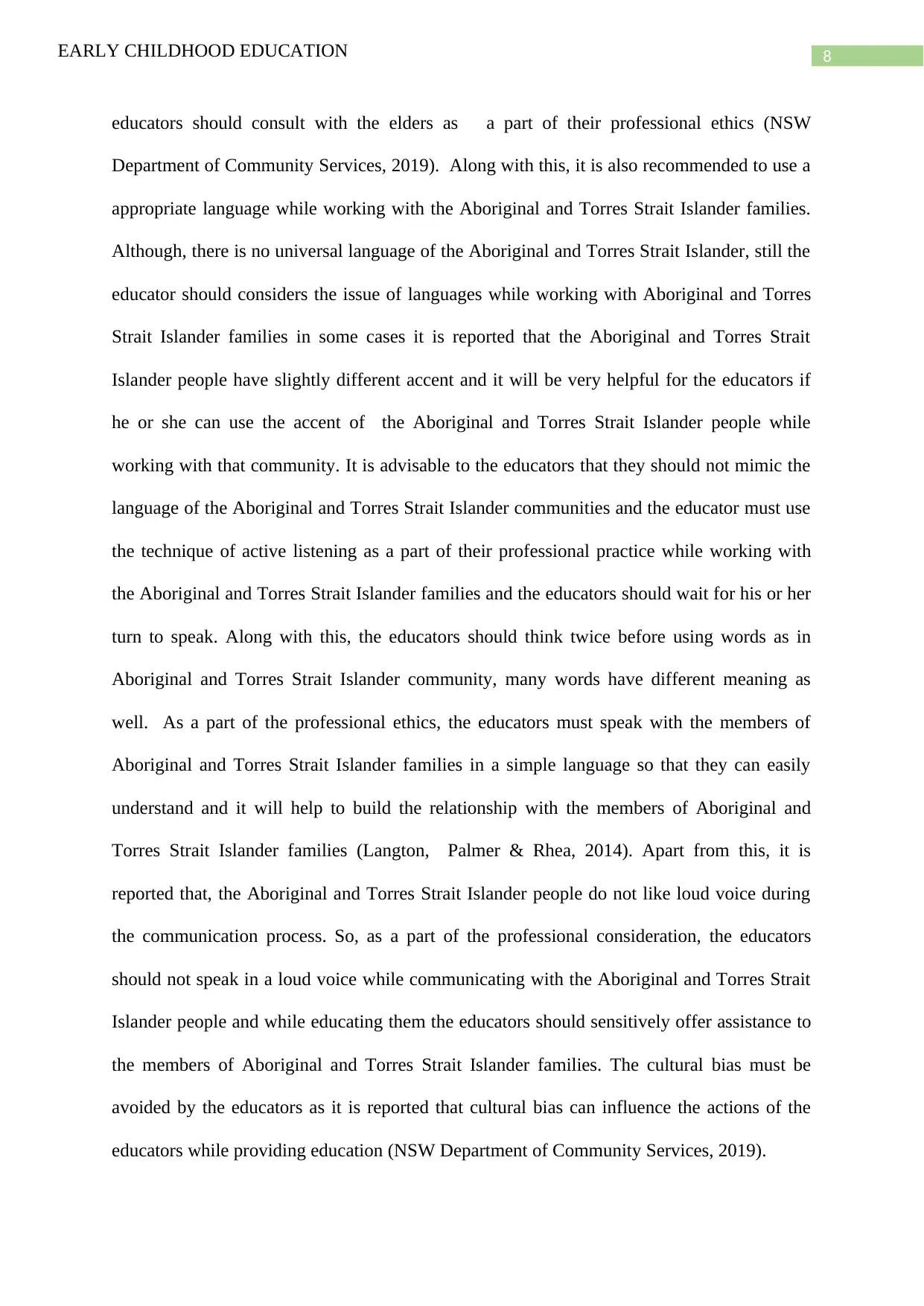
8EARLY CHILDHOOD EDUCATION
educators should consult with the elders as a part of their professional ethics (NSW
Department of Community Services, 2019). Along with this, it is also recommended to use a
appropriate language while working with the Aboriginal and Torres Strait Islander families.
Although, there is no universal language of the Aboriginal and Torres Strait Islander, still the
educator should considers the issue of languages while working with Aboriginal and Torres
Strait Islander families in some cases it is reported that the Aboriginal and Torres Strait
Islander people have slightly different accent and it will be very helpful for the educators if
he or she can use the accent of the Aboriginal and Torres Strait Islander people while
working with that community. It is advisable to the educators that they should not mimic the
language of the Aboriginal and Torres Strait Islander communities and the educator must use
the technique of active listening as a part of their professional practice while working with
the Aboriginal and Torres Strait Islander families and the educators should wait for his or her
turn to speak. Along with this, the educators should think twice before using words as in
Aboriginal and Torres Strait Islander community, many words have different meaning as
well. As a part of the professional ethics, the educators must speak with the members of
Aboriginal and Torres Strait Islander families in a simple language so that they can easily
understand and it will help to build the relationship with the members of Aboriginal and
Torres Strait Islander families (Langton, Palmer & Rhea, 2014). Apart from this, it is
reported that, the Aboriginal and Torres Strait Islander people do not like loud voice during
the communication process. So, as a part of the professional consideration, the educators
should not speak in a loud voice while communicating with the Aboriginal and Torres Strait
Islander people and while educating them the educators should sensitively offer assistance to
the members of Aboriginal and Torres Strait Islander families. The cultural bias must be
avoided by the educators as it is reported that cultural bias can influence the actions of the
educators while providing education (NSW Department of Community Services, 2019).
educators should consult with the elders as a part of their professional ethics (NSW
Department of Community Services, 2019). Along with this, it is also recommended to use a
appropriate language while working with the Aboriginal and Torres Strait Islander families.
Although, there is no universal language of the Aboriginal and Torres Strait Islander, still the
educator should considers the issue of languages while working with Aboriginal and Torres
Strait Islander families in some cases it is reported that the Aboriginal and Torres Strait
Islander people have slightly different accent and it will be very helpful for the educators if
he or she can use the accent of the Aboriginal and Torres Strait Islander people while
working with that community. It is advisable to the educators that they should not mimic the
language of the Aboriginal and Torres Strait Islander communities and the educator must use
the technique of active listening as a part of their professional practice while working with
the Aboriginal and Torres Strait Islander families and the educators should wait for his or her
turn to speak. Along with this, the educators should think twice before using words as in
Aboriginal and Torres Strait Islander community, many words have different meaning as
well. As a part of the professional ethics, the educators must speak with the members of
Aboriginal and Torres Strait Islander families in a simple language so that they can easily
understand and it will help to build the relationship with the members of Aboriginal and
Torres Strait Islander families (Langton, Palmer & Rhea, 2014). Apart from this, it is
reported that, the Aboriginal and Torres Strait Islander people do not like loud voice during
the communication process. So, as a part of the professional consideration, the educators
should not speak in a loud voice while communicating with the Aboriginal and Torres Strait
Islander people and while educating them the educators should sensitively offer assistance to
the members of Aboriginal and Torres Strait Islander families. The cultural bias must be
avoided by the educators as it is reported that cultural bias can influence the actions of the
educators while providing education (NSW Department of Community Services, 2019).
⊘ This is a preview!⊘
Do you want full access?
Subscribe today to unlock all pages.

Trusted by 1+ million students worldwide
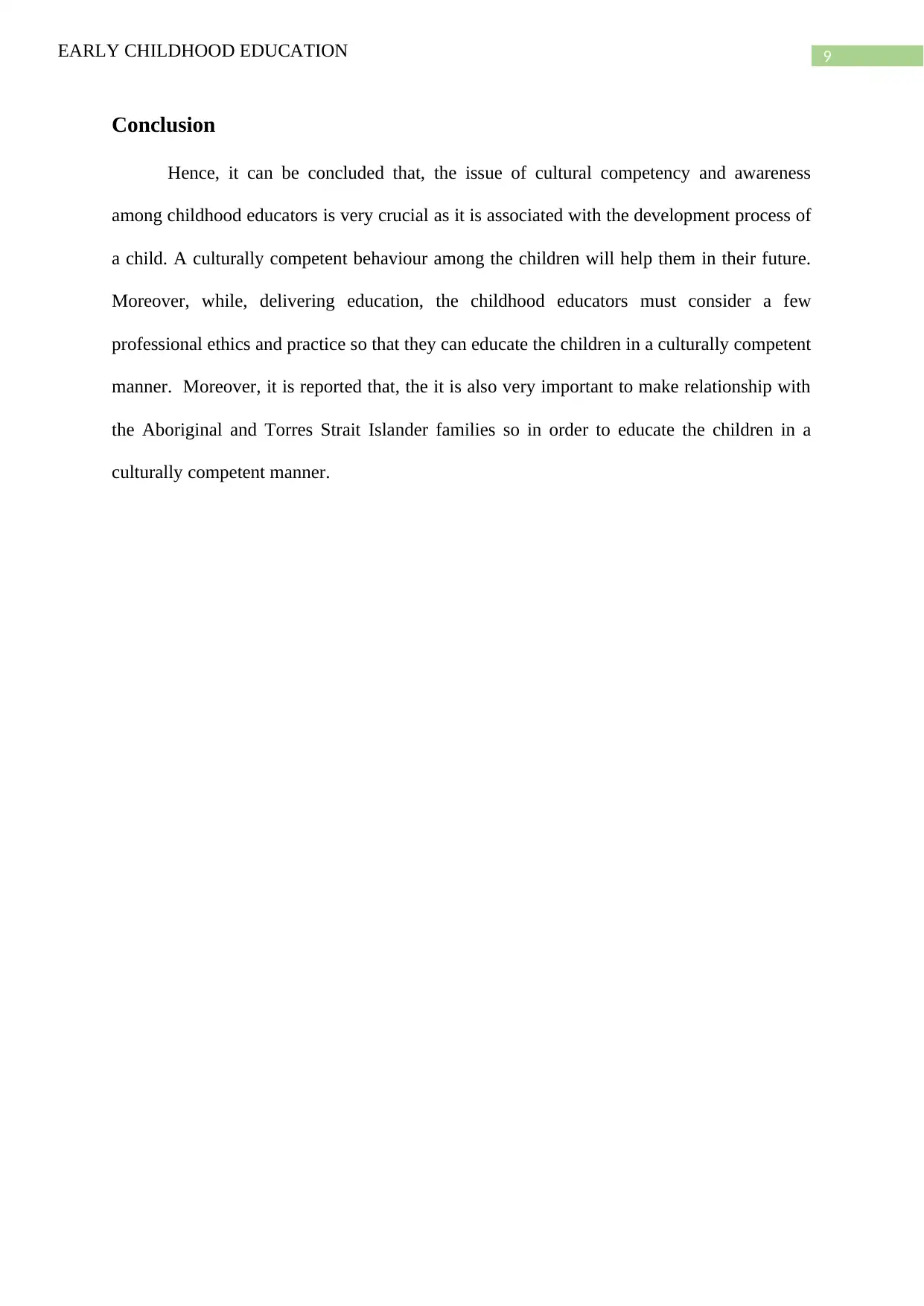
9EARLY CHILDHOOD EDUCATION
Conclusion
Hence, it can be concluded that, the issue of cultural competency and awareness
among childhood educators is very crucial as it is associated with the development process of
a child. A culturally competent behaviour among the children will help them in their future.
Moreover, while, delivering education, the childhood educators must consider a few
professional ethics and practice so that they can educate the children in a culturally competent
manner. Moreover, it is reported that, the it is also very important to make relationship with
the Aboriginal and Torres Strait Islander families so in order to educate the children in a
culturally competent manner.
Conclusion
Hence, it can be concluded that, the issue of cultural competency and awareness
among childhood educators is very crucial as it is associated with the development process of
a child. A culturally competent behaviour among the children will help them in their future.
Moreover, while, delivering education, the childhood educators must consider a few
professional ethics and practice so that they can educate the children in a culturally competent
manner. Moreover, it is reported that, the it is also very important to make relationship with
the Aboriginal and Torres Strait Islander families so in order to educate the children in a
culturally competent manner.
Paraphrase This Document
Need a fresh take? Get an instant paraphrase of this document with our AI Paraphraser
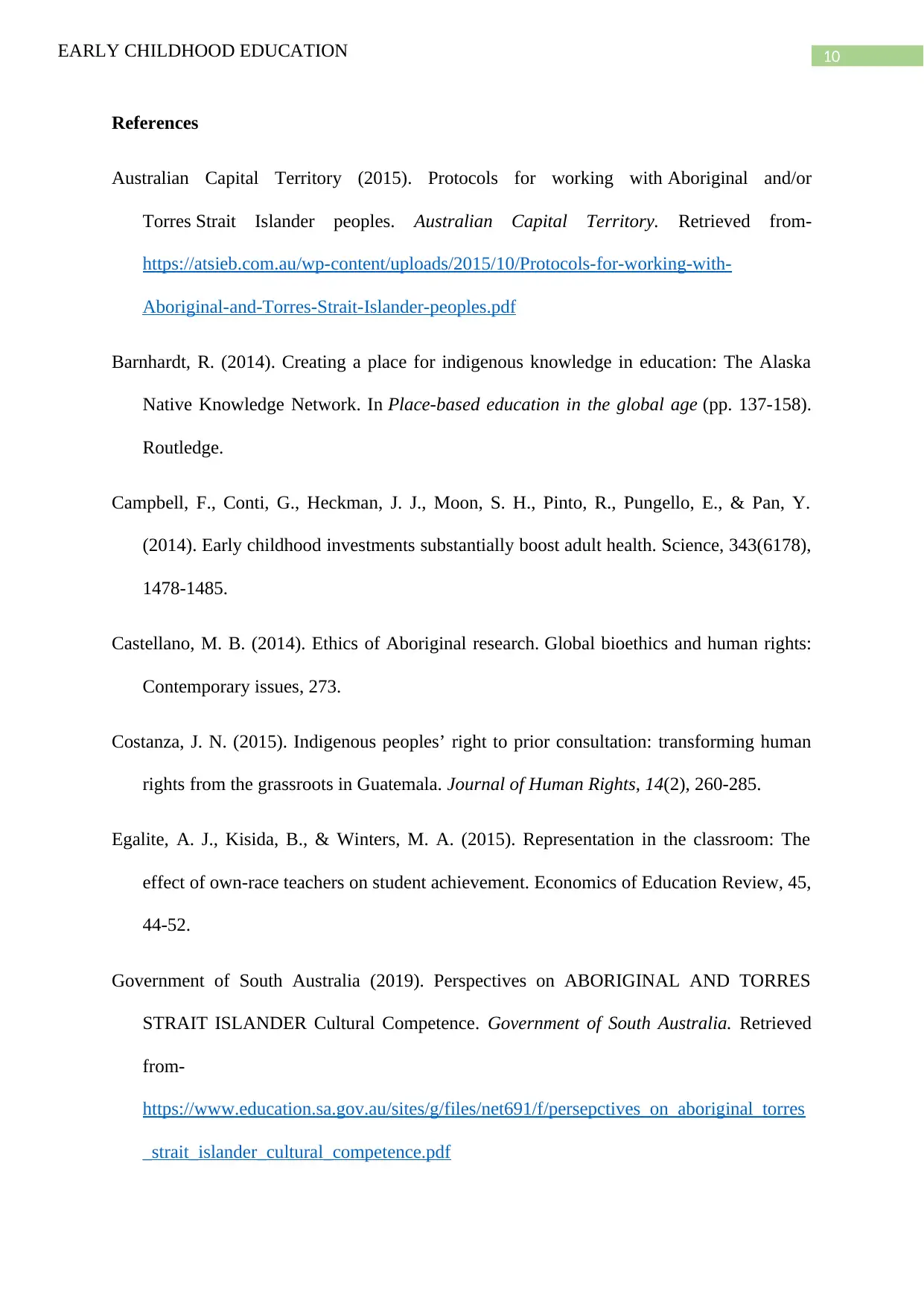
10EARLY CHILDHOOD EDUCATION
References
Australian Capital Territory (2015). Protocols for working with Aboriginal and/or
Torres Strait Islander peoples. Australian Capital Territory. Retrieved from-
https://atsieb.com.au/wp-content/uploads/2015/10/Protocols-for-working-with-
Aboriginal-and-Torres-Strait-Islander-peoples.pdf
Barnhardt, R. (2014). Creating a place for indigenous knowledge in education: The Alaska
Native Knowledge Network. In Place-based education in the global age (pp. 137-158).
Routledge.
Campbell, F., Conti, G., Heckman, J. J., Moon, S. H., Pinto, R., Pungello, E., & Pan, Y.
(2014). Early childhood investments substantially boost adult health. Science, 343(6178),
1478-1485.
Castellano, M. B. (2014). Ethics of Aboriginal research. Global bioethics and human rights:
Contemporary issues, 273.
Costanza, J. N. (2015). Indigenous peoples’ right to prior consultation: transforming human
rights from the grassroots in Guatemala. Journal of Human Rights, 14(2), 260-285.
Egalite, A. J., Kisida, B., & Winters, M. A. (2015). Representation in the classroom: The
effect of own-race teachers on student achievement. Economics of Education Review, 45,
44-52.
Government of South Australia (2019). Perspectives on ABORIGINAL AND TORRES
STRAIT ISLANDER Cultural Competence. Government of South Australia. Retrieved
from-
https://www.education.sa.gov.au/sites/g/files/net691/f/persepctives_on_aboriginal_torres
_strait_islander_cultural_competence.pdf
References
Australian Capital Territory (2015). Protocols for working with Aboriginal and/or
Torres Strait Islander peoples. Australian Capital Territory. Retrieved from-
https://atsieb.com.au/wp-content/uploads/2015/10/Protocols-for-working-with-
Aboriginal-and-Torres-Strait-Islander-peoples.pdf
Barnhardt, R. (2014). Creating a place for indigenous knowledge in education: The Alaska
Native Knowledge Network. In Place-based education in the global age (pp. 137-158).
Routledge.
Campbell, F., Conti, G., Heckman, J. J., Moon, S. H., Pinto, R., Pungello, E., & Pan, Y.
(2014). Early childhood investments substantially boost adult health. Science, 343(6178),
1478-1485.
Castellano, M. B. (2014). Ethics of Aboriginal research. Global bioethics and human rights:
Contemporary issues, 273.
Costanza, J. N. (2015). Indigenous peoples’ right to prior consultation: transforming human
rights from the grassroots in Guatemala. Journal of Human Rights, 14(2), 260-285.
Egalite, A. J., Kisida, B., & Winters, M. A. (2015). Representation in the classroom: The
effect of own-race teachers on student achievement. Economics of Education Review, 45,
44-52.
Government of South Australia (2019). Perspectives on ABORIGINAL AND TORRES
STRAIT ISLANDER Cultural Competence. Government of South Australia. Retrieved
from-
https://www.education.sa.gov.au/sites/g/files/net691/f/persepctives_on_aboriginal_torres
_strait_islander_cultural_competence.pdf
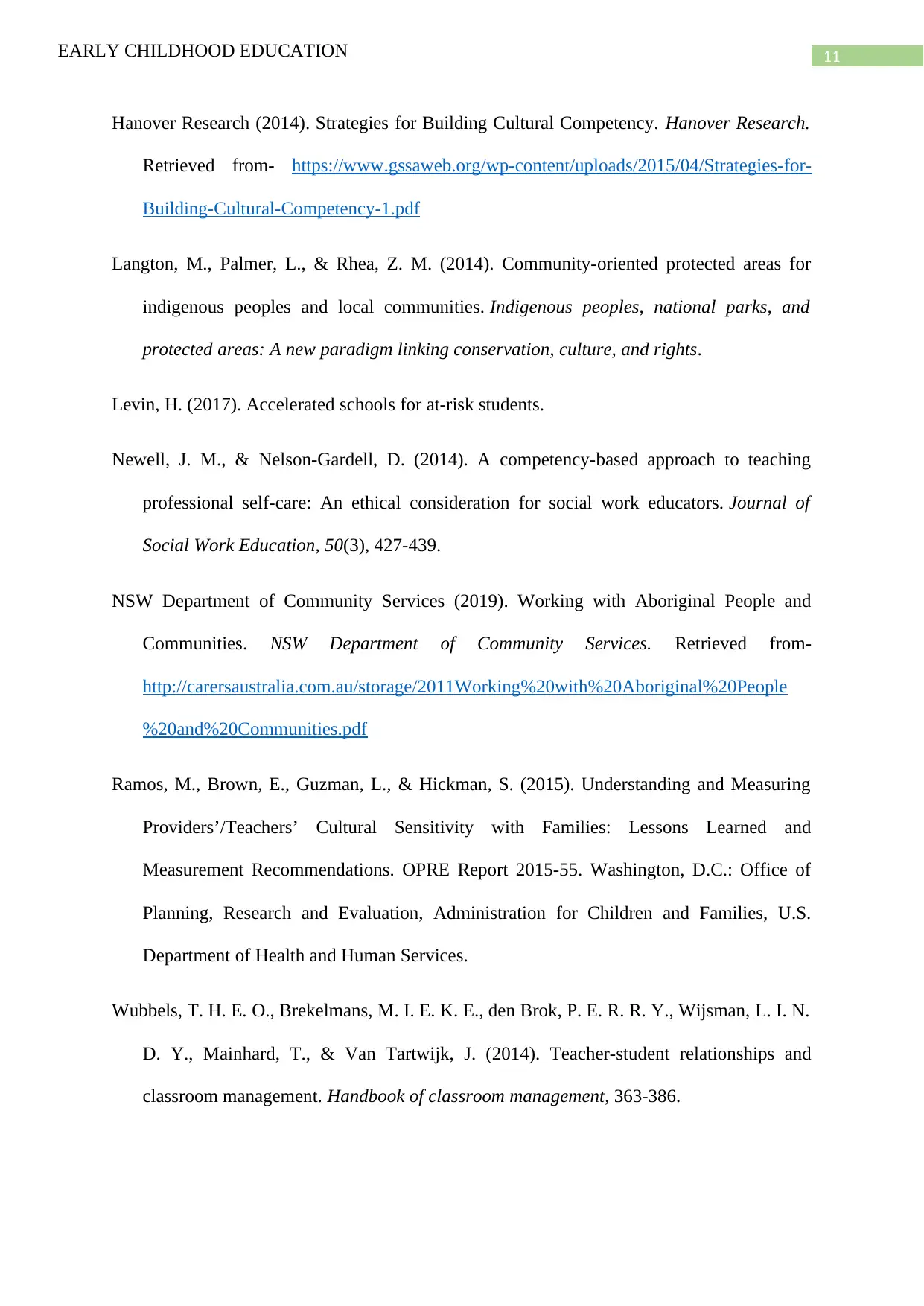
11EARLY CHILDHOOD EDUCATION
Hanover Research (2014). Strategies for Building Cultural Competency. Hanover Research.
Retrieved from- https://www.gssaweb.org/wp-content/uploads/2015/04/Strategies-for-
Building-Cultural-Competency-1.pdf
Langton, M., Palmer, L., & Rhea, Z. M. (2014). Community-oriented protected areas for
indigenous peoples and local communities. Indigenous peoples, national parks, and
protected areas: A new paradigm linking conservation, culture, and rights.
Levin, H. (2017). Accelerated schools for at-risk students.
Newell, J. M., & Nelson-Gardell, D. (2014). A competency-based approach to teaching
professional self-care: An ethical consideration for social work educators. Journal of
Social Work Education, 50(3), 427-439.
NSW Department of Community Services (2019). Working with Aboriginal People and
Communities. NSW Department of Community Services. Retrieved from-
http://carersaustralia.com.au/storage/2011Working%20with%20Aboriginal%20People
%20and%20Communities.pdf
Ramos, M., Brown, E., Guzman, L., & Hickman, S. (2015). Understanding and Measuring
Providers’/Teachers’ Cultural Sensitivity with Families: Lessons Learned and
Measurement Recommendations. OPRE Report 2015-55. Washington, D.C.: Office of
Planning, Research and Evaluation, Administration for Children and Families, U.S.
Department of Health and Human Services.
Wubbels, T. H. E. O., Brekelmans, M. I. E. K. E., den Brok, P. E. R. R. Y., Wijsman, L. I. N.
D. Y., Mainhard, T., & Van Tartwijk, J. (2014). Teacher-student relationships and
classroom management. Handbook of classroom management, 363-386.
Hanover Research (2014). Strategies for Building Cultural Competency. Hanover Research.
Retrieved from- https://www.gssaweb.org/wp-content/uploads/2015/04/Strategies-for-
Building-Cultural-Competency-1.pdf
Langton, M., Palmer, L., & Rhea, Z. M. (2014). Community-oriented protected areas for
indigenous peoples and local communities. Indigenous peoples, national parks, and
protected areas: A new paradigm linking conservation, culture, and rights.
Levin, H. (2017). Accelerated schools for at-risk students.
Newell, J. M., & Nelson-Gardell, D. (2014). A competency-based approach to teaching
professional self-care: An ethical consideration for social work educators. Journal of
Social Work Education, 50(3), 427-439.
NSW Department of Community Services (2019). Working with Aboriginal People and
Communities. NSW Department of Community Services. Retrieved from-
http://carersaustralia.com.au/storage/2011Working%20with%20Aboriginal%20People
%20and%20Communities.pdf
Ramos, M., Brown, E., Guzman, L., & Hickman, S. (2015). Understanding and Measuring
Providers’/Teachers’ Cultural Sensitivity with Families: Lessons Learned and
Measurement Recommendations. OPRE Report 2015-55. Washington, D.C.: Office of
Planning, Research and Evaluation, Administration for Children and Families, U.S.
Department of Health and Human Services.
Wubbels, T. H. E. O., Brekelmans, M. I. E. K. E., den Brok, P. E. R. R. Y., Wijsman, L. I. N.
D. Y., Mainhard, T., & Van Tartwijk, J. (2014). Teacher-student relationships and
classroom management. Handbook of classroom management, 363-386.
⊘ This is a preview!⊘
Do you want full access?
Subscribe today to unlock all pages.

Trusted by 1+ million students worldwide
1 out of 13
Related Documents
Your All-in-One AI-Powered Toolkit for Academic Success.
+13062052269
info@desklib.com
Available 24*7 on WhatsApp / Email
![[object Object]](/_next/static/media/star-bottom.7253800d.svg)
Unlock your academic potential
Copyright © 2020–2026 A2Z Services. All Rights Reserved. Developed and managed by ZUCOL.




